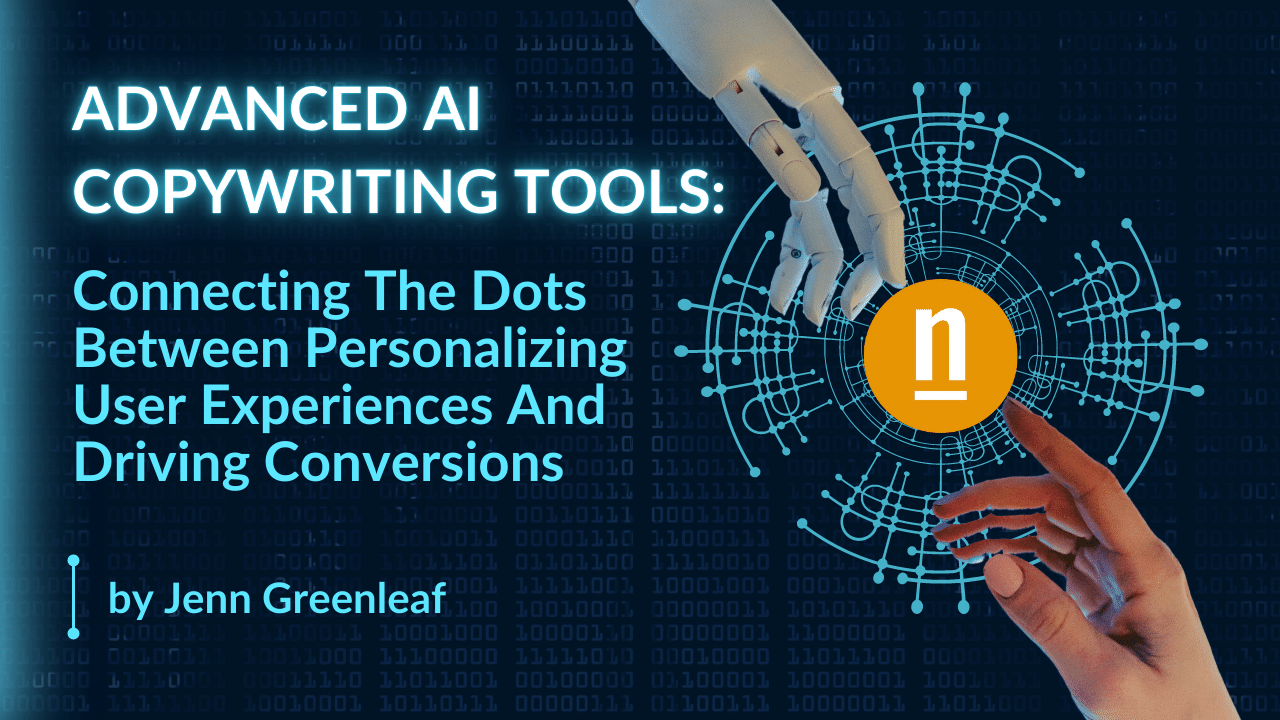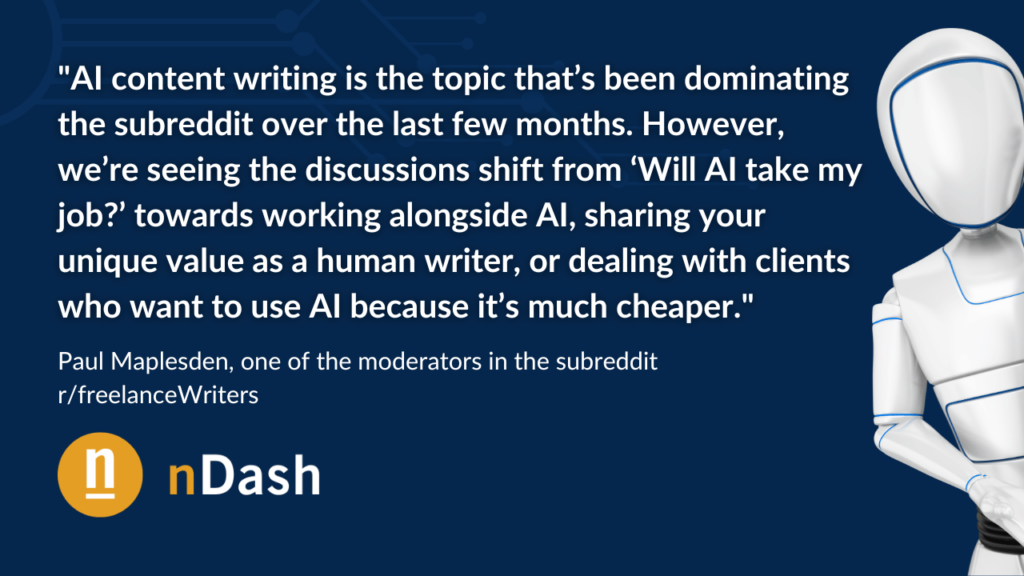Digital marketing is constantly changing, and many believe that AI copywriting tools are a primary driver of this transformation. These innovative technologies are changing how marketers and agencies create content, allowing them to produce personalized, compelling, and high-performing content.
Personalization in Marketing: Why it’s Important
Personalization in marketing has become increasingly important in today’s competitive business landscape. It offers numerous benefits, including increased engagement, enhanced customer experience, and improved brand loyalty, all contributing to overall business success.
But what does personalization have to do with AI copywriting tools?
In a paper published in The Harvard Business Review by David C. Edelman and Mark Abraham, they speak extensively on this topic. They state, “We are now at the point where competitive advantage will be based on the ability to capture, analyze, and utilize personalized customer data at scale and on how a company uses AI to understand, shape, customize, and optimize the customer journey.”
The authors continue, “Businesses are combining multiple AI, martech, and back-office solutions connected through common-application programming interfaces to better develop and use personalization data.”
AI Copywriting Tools and Personalized User Experiences
No one likes feeling like they’re “just a number.” Audiences want to know you’re creating content to educate, solve a problem, or help with decision-making.
The debate continues regarding whether or not copywriters should use AI to create content. In a recent interview with Paul Maplesden, one of the moderators of the subreddit r/freelanceWriters, he shared that this is a hot topic of conversation. He said, “AI content writing is the topic that’s been dominating the subreddit over the last few months.”
He continues, “However, we’re seeing the discussions shift from ‘Will AI take my job?’ towards working alongside AI, sharing your unique value as a human writer, or dealing with clients who want to use AI because it’s much cheaper.”
These tools aren’t there yet for creating blog posts, white papers, and other data-driven or fact-based materials. But there is a place for them in other areas of content creation. For example, if you’re struggling with ideation or defining metrics (more on that below).
When asked to share her take on AI’s place in content creation, Linda Pophal, owner of Strategic Communications and nDash freelancer, agrees that it isn’t the best tool for creating content. She says, “I’ve been experimenting with ChatGPT, and while I’m not yet sold on its use to actually create content, I’ve found that it can be very useful for research and idea generation.”
She explains, “For instance, I can provide it with a long source article or report and ask it to summarize the key points or to give me a list of top trends for some topic. I’ve also been experimenting with using it as an editor–asking it to review and ‘tighten up’ my copy.”
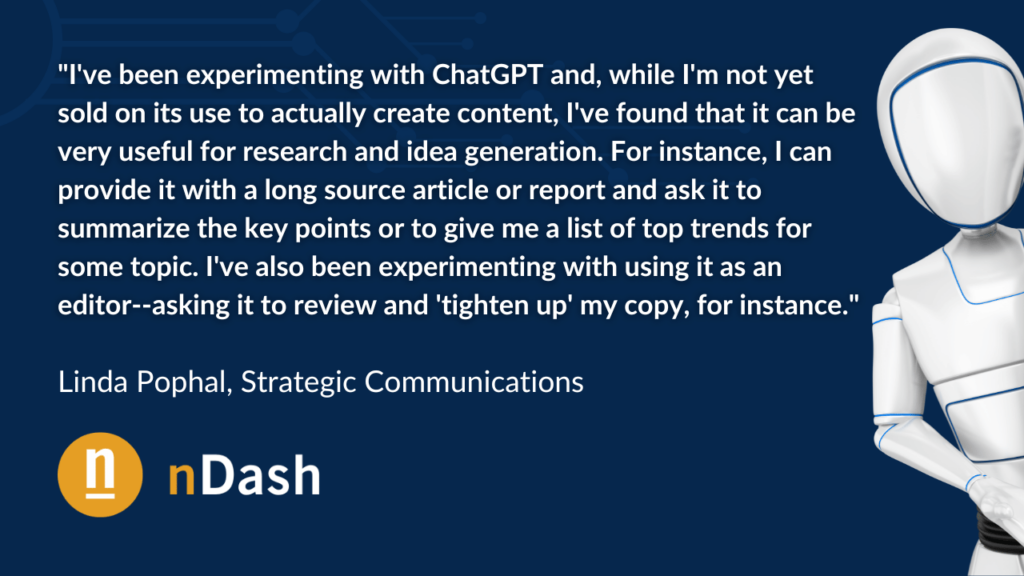
Types of Personalized Content These Tools Can Create
In a blog written for Hootsuite by Christina Newberry, she writes, “AI-powered content creation tools do more than create content. They also help you understand what kind of content your audience is looking for and improve your SEO.”
Above all, we recommend testing to ensure you’re maintaining authenticity and accuracy. Here are some examples of where you can use these tools to create first drafts and inform the content creation process:
- Ads: These tools help brands produce personalized ads with customized messaging, visuals, and calls to action for diverse target groups, enhancing ad performance.
- Ideation: AI can offer ideas for content based on keywords and other prompts.
- Outlines: Use these tools to generate the foundation for an outline. Then, use independent research, interviews, and so on to level it up.
- Product descriptions: Create distinct product descriptions based on customer data, making the content more appealing and relevant to each individual.
- Recommendations: AI can offer customized content or product suggestions based on user behavior, preferences, or past purchases, boosting customer satisfaction and sales.
- Social media posts: Generate tailored content for various platforms, optimizing post attributes like length, tone, and hashtags for specific audiences.
- User-generated content: Use these tools to analyze and repurpose user-created content like reviews or social media posts, crafting personalized marketing materials that resonate with the target audience.
We talked to Kara Harnett, one of nDash’s freelance writers, about her take on the types of content AI is useful for. She states, “AI has the power to revolutionize the way we brainstorm ideas, serving as an ever-evolving creative muse that sparks our imagination and stimulates out-of-the-box thinking.”
She continues, “By tapping into vast data sources and providing unique insights, AI becomes the perfect partner in ideation, fueling our creativity and unlocking innovative solutions that propel us forward.”
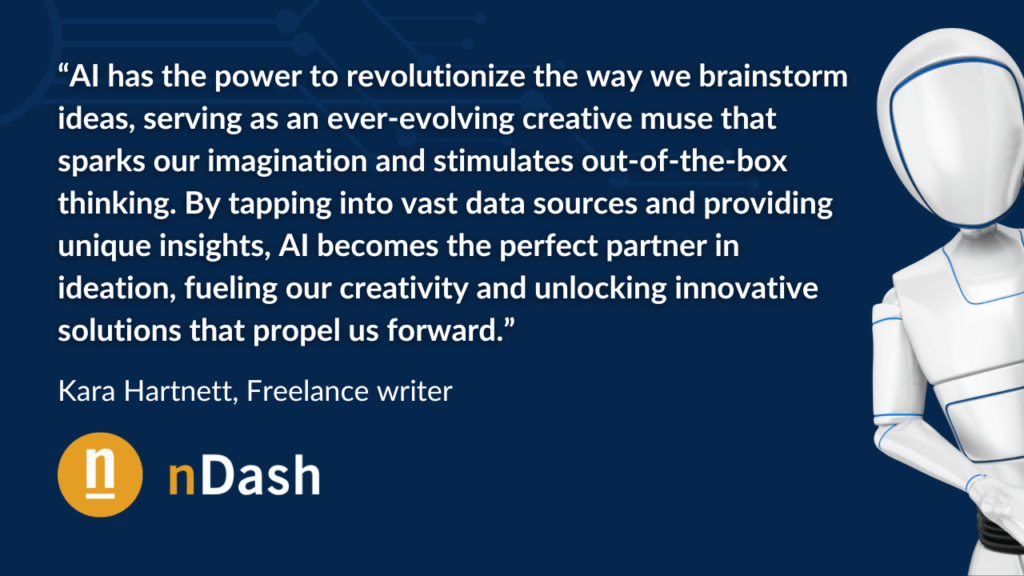
Best Practices in Personalized Copywriting Using AI
We talked to freelance writer Aimee Pearcy about where she believes AI is most useful. She explains, “Using AI tools can be a great way to kickstart your creative process and eliminate the grunt work that is typically involved in content creation so you create more space for high-level tasks.”
She continues, “I often use ChatGPT-3 to help me come up with new article ideas to pitch to publications and give me suggestions of different professionals I could interview to help provide a well-rounded perspective for my audience.”
Here are some best practices focused on how to use these tools to create personalized content:
- Define your target audience: Tools like Google Analytics, Hootsuite Insights, Semrush, and Adobe Analytics leverage machine learning and other AI technologies to analyze data and uncover insights about your audience.
- Leverage data: Use these tools to analyze and process data, which you can leverage to create personalized marketing strategies and enhance customer engagement.
- Maintain consistency: Ensure your copy remains consistent with your brand identity and messaging across all channels, including your website, email campaigns, and social media.
- Monitor performance: Regularly track key performance indicators (KPIs) to measure the effectiveness of your efforts. Use these insights to refine your approach and improve results.
- Emphasize personalization, not just customization: Go beyond simple customization (e.g., using a customer’s name) to create truly personalized content that resonates with individual interests, preferences, and behaviors. This deeper level of personalization will enhance the effectiveness of your copywriting efforts.
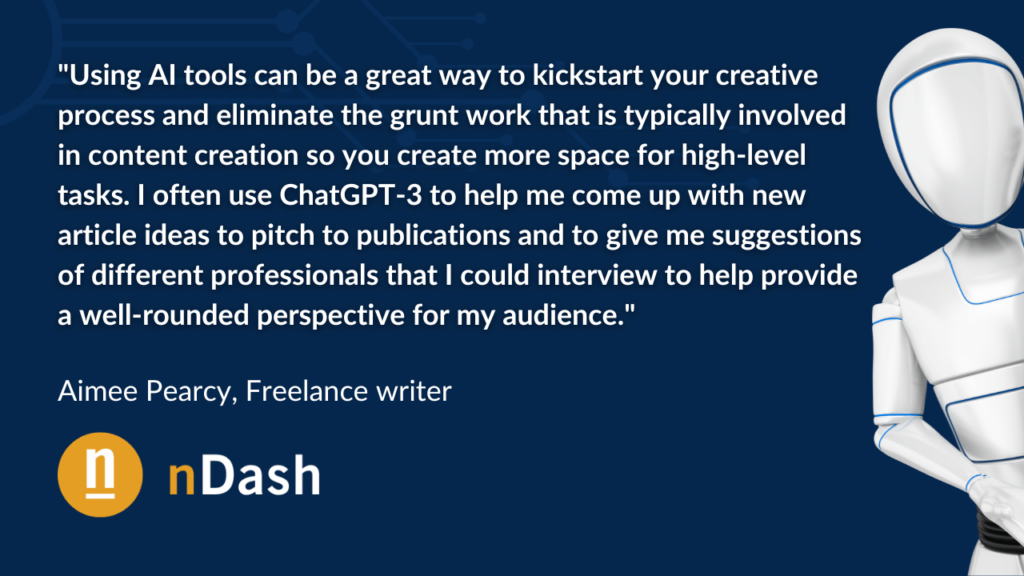
Selecting the Right AI Copywriting Tools
In a recent survey by Capterra, we learned that 63% of marketers use AI for email marketing, 58% for advertising, and 57% for data analysis.
With several options available, determining which tool best suits your needs can be challenging. Here are four factors to consider when selecting the right AI copywriting tools:
Evaluating Ease of Use
A user-friendly interface ensures you can navigate the platform easily and start generating content as soon as possible. When assessing the usability of a tool, consider the following questions:
- Is the tool’s interface intuitive and straightforward?
- Are tutorials or guides available to help you understand how to use the platform?
- Is the learning curve manageable?
By ensuring that the tool is easy to use, you can save time and make the most of its capabilities.
Assessing Features and Capabilities
Each tool has unique features that cater to different needs. Some common features include grammar and spell-checking, keyword optimization, and plagiarism detection. Compare the features of various tools to determine which one best aligns with your needs.
Aimee explains, “Grammarly’s AI tool is a resource that I use to check the tone of an article once I’ve finished writing it. It’s also a great way to check for grammatical errors that might have slipped through!”
Comparing Pricing Options
Most tools offer a range of pricing plans, like monthly or annual subscriptions, pay-as-you-go, or one-time payment options. Be sure to evaluate the costs associated with each plan and consider factors like the number of users and access to premium features.
Prioritizing Customer Support
Good customer support ensures you receive prompt and helpful assistance when encountering issues or having questions about the platform. When evaluating customer support, consider factors like response time, support channels available, and the help document’s quality.
Embracing AI Copywriting Tools for Personalized Marketing Success
Personalization in marketing has become essential to successful digital marketing strategies. AI copywriting tools have emerged as powerful allies in creating tailored content that resonates with audiences. Leveraging advanced technologies like NLP, pre-trained language models, and data analysis, AI copywriting tools offer significant benefits. These tools can enhance content quality, user engagement, and conversion rates.
